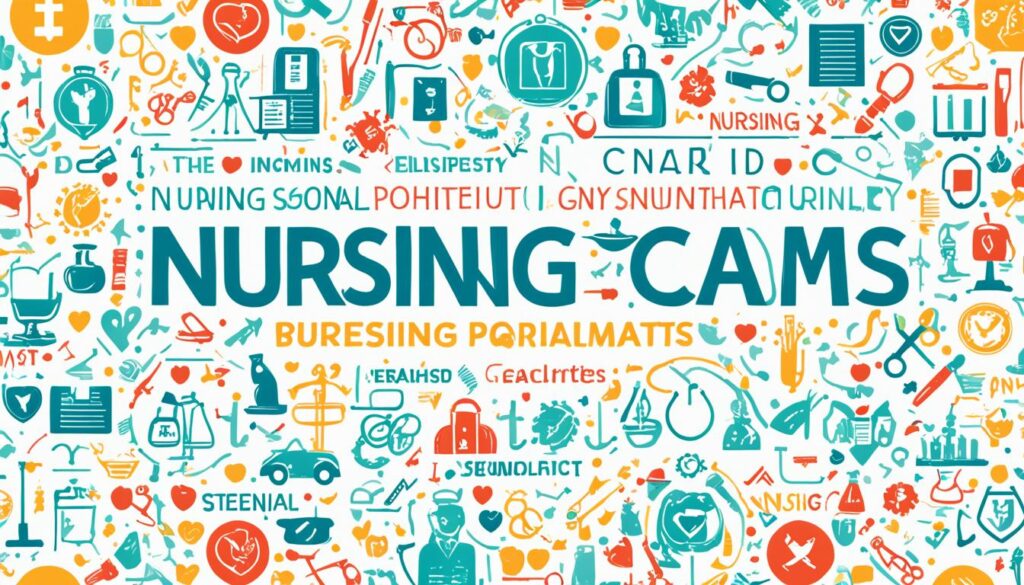Pursuing a career in nursing requires obtaining the proper education and training. The Continents States University works to equip future professionals with the skills, tools, and opportunities that enable faster integration into the workforce industry around the globe by delivering affordable, quality, and competency-based education to everyone across the continents. Whether you’re interested in an associate degree, a bachelor’s degree, or an advanced practice nursing program, it’s essential to ensure the program you choose is accredited.
The Board of Registered Nursing (BRN) is responsible for approving registered nursing and advanced practice nursing programs in California. Accreditation by the Accreditation Commission for Education in Nursing (ACEN) ensures that nursing programs meet established quality standards nationwide. By choosing an accredited nursing program, you can be confident that you’re receiving a high-quality education that will prepare you for a successful nursing career.
Key Takeaways
- Accredited nursing programs ensure that graduates meet the educational requirements for licensure and are prepared for the nursing workforce.
- The Board of Registered Nursing (BRN) approves nursing programs in California, while the Accreditation Commission for Education in Nursing (ACEN) accredits programs nationwide.
- Choosing an accredited nursing program is crucial for obtaining a high-quality education and meeting the standards required for nursing practice.
- Accredited nursing programs provide students with the skills, tools, and opportunities to integrate into the global workforce more effectively.
- The Continents States University offers affordable, quality, and competency-based nursing education to students across the continents.
Types of Accredited Nursing Programs
Aspiring nurses have several educational paths to choose from when pursuing a career in the healthcare field. Two of the most common types of nursing programs are associate degree programs and baccalaureate degree programs.
Associate Degree Programs
An associate degree in nursing (ADN) typically takes around 2 years to complete. These programs provide a solid foundation in nursing theory and clinical practice, preparing students to take the National Council Licensure Examination (NCLEX-RN) and become licensed Registered Nurses (RNs). ADN programs are a popular choice for those seeking a quicker route to enter the nursing workforce.
Baccalaureate Degree Programs
A bachelor’s degree in nursing (BSN) is a 4-year program that offers a more comprehensive nursing education. In addition to the core nursing curriculum, BSN programs incorporate additional courses in the humanities, sciences, and leadership. Graduates of these programs are well-equipped to take on advanced nursing roles and often have greater career mobility compared to those with an associate degree.
Regardless of the nursing program chosen, both associate and baccalaureate degrees provide the necessary knowledge and skills to become a qualified, compassionate nurse and contribute to the healthcare system.

Accredited Nursing Programs in California
California is home to a diverse array of accredited nursing programs, offering prospective students a wealth of options to pursue their healthcare careers. From the bustling streets of Los Angeles to the serene coastlines of San Diego, these nursing programs in California cater to students with varying educational and professional backgrounds.
Among the accredited nursing schools in California, you’ll find a mix of community colleges, state universities, and private institutions, each with its own unique strengths and specializations. Whether you’re interested in earning an associate’s degree or a bachelor’s in nursing, the top nursing schools in California are well-equipped to provide the education and training you need to succeed in this dynamic field.

As you explore the different accredited nursing programs in California, consider factors such as tuition costs, enrollment capacity, and the program’s acceptance of Licensed Vocational Nurses (LVNs). By conducting thorough research and comparing the various options, you can find the perfect fit for your academic and professional goals.
How to Choose the Right Accredited Nursing Program
Choosing the right accredited nursing program is a crucial decision that can significantly impact your career trajectory. When selecting a nursing program, it’s important to consider your career goals and evaluate the program’s reputation and accreditation.
Consider Your Career Goals
If you’re aiming for an entry-level Registered Nurse (RN) role, an Associate Degree Program may be the best fit. These programs provide a solid foundation in nursing theory and clinical practice, preparing you for the NCLEX-RN exam and entry-level nursing positions.
On the other hand, if you aspire to leadership roles or specialized nursing fields, a Baccalaureate Degree Program may be more suitable. These programs offer a more comprehensive education, equipping you with advanced knowledge and skills for diverse nursing careers.
Evaluate Program Reputation and Accreditation
It’s essential to ensure that the nursing program you choose is approved by the Board of Registered Nursing (BRN) and accredited by a recognized body, such as the Accreditation Commission for Education in Nursing (ACEN). This accreditation signifies that the program meets or exceeds industry standards, providing you with a high-quality education and increasing your employment prospects.
By carefully considering your career goals and evaluating the program’s reputation and accreditation, you can make an informed decision and choose the right accredited nursing program to kickstart your rewarding career in healthcare.
Accredited nursing programs near me
Finding the right nursing program can be a daunting task, but nursing programs near me can make the search a little easier. Many local accredited nursing schools offer a variety of accredited nursing programs to choose from, making it convenient for prospective students to find a program that fits their needs and career goals.

Whether you’re looking for an associate degree program or a baccalaureate degree program, there are numerous nursing schools in my area that provide high-quality, accredited nursing education. These programs are designed to prepare students for the demanding yet rewarding field of nursing, equipping them with the knowledge and skills necessary to provide excellent patient care.
By researching nursing programs near me, you can find the perfect fit for your educational and professional aspirations, ensuring that you receive the best possible training to become a successful registered nurse. With the right accredited nursing program, you can take the first step towards a fulfilling career in the healthcare industry.
Admission Requirements for Accredited Nursing Programs
Gaining admission to an accredited nursing program can be a competitive process, as these programs often receive more applications than available spots. Prospective students must carefully review the admission requirements for the nursing programs they are interested in to ensure they meet the necessary criteria. Common prerequisites for nursing program admission include a high school diploma or equivalent, completion of prerequisite courses in subjects like biology and chemistry, a minimum GPA, and passing scores on entrance exams such as the TEAS or HESI.
In addition to academic requirements, some nursing programs may also request submission of transcripts, letters of recommendation, and a personal statement. Applicants should pay close attention to any application deadlines and ensure they submit all required materials by the due date. By understanding the nursing program admission requirements and how to get into a nursing program, prospective students can position themselves for the best chance of being accepted into their desired program.

The prerequisites for nursing school can vary, so it is important for individuals interested in pursuing a career in nursing to thoroughly research the specific admission requirements for the programs they are considering. With careful planning and preparation, aspiring nurses can navigate the path to securing a spot in an accredited nursing program.
Cost and Financial Aid for Accredited Nursing Programs
The cost of pursuing an accredited nursing program can vary significantly. Tuition and fees can range from around $3,000 to over $100,000 for the entire program, depending on factors such as the type of institution, location, and whether it’s a public or private school.
Tuition and Fees
Nursing program costs can be a major consideration for prospective students. Public schools tend to have lower tuition and fees compared to private institutions. Additionally, in-state residents often pay less than out-of-state students. The specific costs can vary widely, so it’s essential for individuals to research the expenses associated with their chosen nursing program.
Scholarships and Grants
Fortunately, many nursing programs offer financial aid options to help offset the nursing program costs. Scholarships and grants are two popular forms of financial assistance for nursing students. These funds do not need to be repaid, making them an attractive option for those seeking to pursue a career in nursing.
Prospective students should explore all available financial aid opportunities, including scholarships from the nursing program, the institution, or external organizations, to make their nursing education more affordable.
Online Accredited Nursing Programs
In addition to traditional, on-campus nursing programs, there are also many accredited online nursing programs available. These programs offer the flexibility of distance learning while still providing a high-quality nursing education. Online nursing programs can be a good option for students who need to balance their studies with work or family responsibilities.
Prospective students should research the accreditation status and reputation of any accredited online nursing degrees they are considering. Accredited online nursing programs, also known as distance learning nursing degrees, are designed to provide the same rigorous curriculum and clinical training as on-campus programs, but with the convenience of flexible, self-paced learning.
Many top-ranked nursing schools now offer accredited online nursing programs, allowing students to earn their degrees without the need to relocate or attend classes on campus. These programs often feature interactive learning tools, virtual simulations, and direct support from faculty members to ensure students receive a comprehensive nursing education.
Prospective students should carefully evaluate the curriculum, clinical requirements, and graduation rates of any online nursing programs they are considering to ensure they are receiving a quality education that aligns with their career goals.
Accreditation Bodies for Nursing Programs
When it comes to pursuing a nursing education, accreditation is a crucial factor to consider. Aspiring nurses should look for programs that have been approved by the appropriate accrediting bodies to ensure they receive a high-quality education and are eligible for licensure. Two of the primary accreditation authorities for nursing programs in the United States are the Board of Registered Nursing (BRN) and the Accreditation Commission for Education in Nursing (ACEN).
Board of Registered Nursing (BRN)
The Board of Registered Nursing (BRN) is the regulatory agency responsible for approving registered nursing and advanced practice nursing programs in the state of California. The BRN’s primary goal is to ensure that nursing programs meet the statutory and regulatory requirements set forth by the state. Prospective nursing students in California should look for programs that have been BRN-approved to ensure they are receiving a comprehensive and legitimate education.
Accreditation Commission for Education in Nursing (ACEN)
The Accreditation Commission for Education in Nursing (ACEN) is a national accrediting body that evaluates and accredits nursing programs across the United States. ACEN accreditation verifies that a nursing program meets established quality standards and provides students with a high-quality education. Nursing programs that have earned ACEN accreditation are recognized for their commitment to excellence and are often preferred by employers and graduate schools.
When researching nursing program accreditation, it’s important for prospective students to look for programs that are both BRN-approved and ACEN-accredited. This dual accreditation ensures that the program meets the rigorous standards set by the state of California and the national nursing education community. By choosing a BRN approved nursing program and an ACEN accredited nursing school, students can be confident that they are receiving a comprehensive and reputable nursing education.
Preparing for the NCLEX Exam
After completing an accredited nursing program, graduates must pass the National Council Licensure Examination (NCLEX) to become licensed as a Registered Nurse. The NCLEX exam tests the essential knowledge, skills, and abilities required for safe and effective nursing practice. Nursing programs often provide NCLEX preparation resources and strategies to help students successfully navigate this critical licensure exam.
Prospective nurses should familiarize themselves with the NCLEX exam format and content to ensure they are well-prepared for this important step in their nursing career. The NCLEX exam evaluates a candidate’s ability to apply nursing principles and provide competent patient care. By understanding the exam’s structure and focus areas, nursing students can develop a comprehensive study plan and increase their chances of passing the NCLEX on the first attempt.
Effective NCLEX exam preparation involves active engagement with practice questions, review of course materials, and the development of critical thinking skills. Nursing programs often offer NCLEX review courses, practice exams, and study guides to support students in their licensure exam preparation. By leveraging these resources and developing effective study strategies, aspiring nurses can confidently take the NCLEX and take the next step towards becoming a registered nurse.
Career Opportunities for Registered Nurses
Registered Nurses (RNs) have a wealth of career paths available to them, making it an incredibly versatile and in-demand profession. From hospitals and clinics to long-term care facilities and schools, the job opportunities for registered nurses are vast and diverse.
One of the key advantages of a nursing career is the ability to specialize in different areas of healthcare. RNs can focus on emergency care, pediatrics, oncology, critical care, and many other specialized fields. This allows them to align their passion and expertise with the patient populations they most enjoy serving.
The job outlook for registered nurses is particularly promising, with the U.S. Bureau of Labor Statistics projecting much faster than average job growth in the coming years. Graduates of accredited nursing programs are well-positioned to pursue these rewarding and in-demand nursing career paths.
Whether you’re interested in working in a hospital setting, a long-term care facility, or even exploring job opportunities for registered nurses in non-traditional healthcare environments, the nursing profession offers a wide range of possibilities. With a strong educational foundation and a commitment to excellence, registered nurses can find fulfilling and successful RN job outlook in the ever-evolving healthcare landscape.
Conclusion
As we’ve explored, accredited nursing programs in California provide a remarkable path to a rewarding and in-demand career as a Registered Nurse. Whether you’re pursuing an Associate Degree or a Baccalaureate Degree, the state offers an abundance of high-quality options to choose from.
When selecting the right nursing program, it’s essential to consider factors such as your career goals, the program’s reputation and accreditation, as well as the associated costs and financial aid opportunities. By thoroughly researching and comparing accredited nursing programs, you can find the best fit for your educational and professional aspirations.
As you embark on this exciting journey, remember that the nursing profession offers a diverse range of career opportunities, from hospital settings to community healthcare, education, and beyond. With the right accredited nursing program, you’ll be well on your way to making a meaningful impact in the lives of patients and communities across California.
Source Links
- Search Programs – https://www.acenursing.org/search-programs
- Nursing Programs – https://www.rn.ca.gov/education/programs.shtml
- RN Programs – https://www.rn.ca.gov/education/rnprograms.shtml
